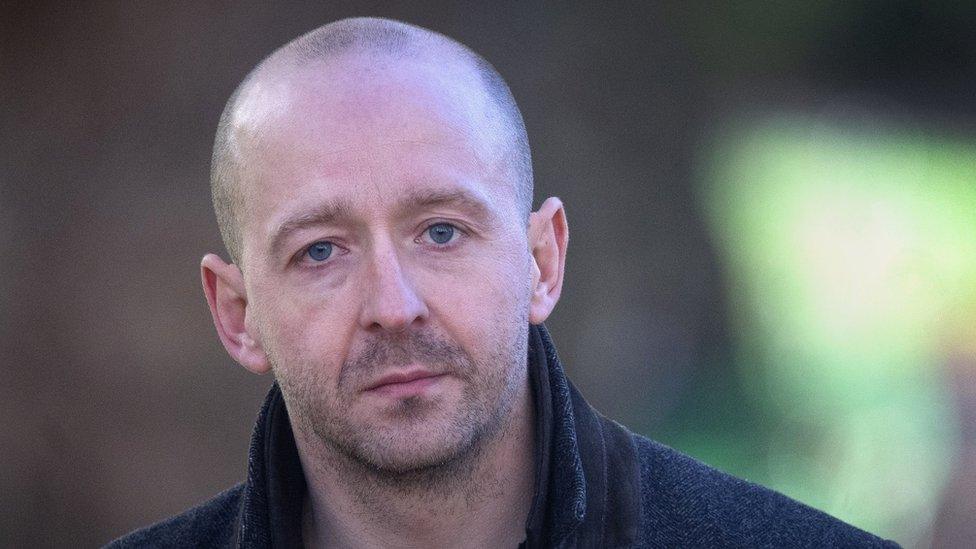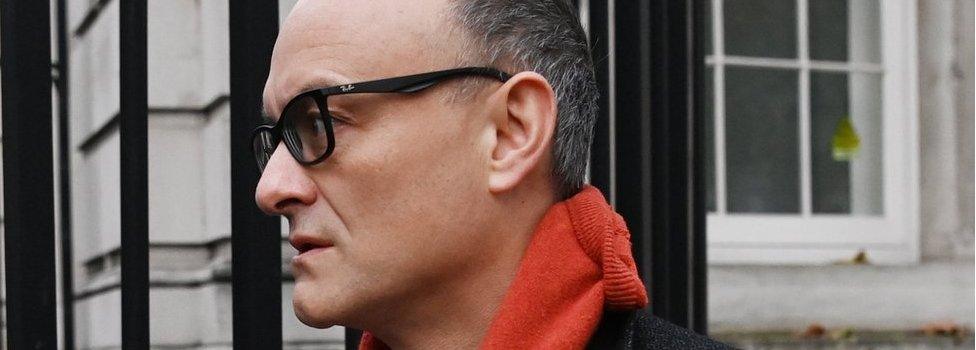Dominic Cummings: PM's top adviser leaves No 10 to 'clear the air'
- Published
Dominic Cummings leaves Number 10
Dominic Cummings has left Downing Street after internal battles over his role as Boris Johnson's chief adviser.
The BBC understands he will continue to work from home, on issues such as mass coronavirus testing, until the middle of December.
The prime minister is said to want to "clear the air and move on".
Mr Cummings has been at the heart of a No 10 power struggle, which has also seen communications director Lee Cain leave.
Several Tory MPs have welcomed the pair's departure as a chance for Mr Johnson to make a fresh start.
BBC political editor Laura Kuenssberg said Mr Cummings' departure from No 10 had been brought forward given the "upset in the team" in Downing Street, for which she said it had been a "difficult week".
She said there had been long-running tensions between different factions in No 10 but this "slow burning fuse exploded fast when it finally happened".
Mr Cummings and Mr Cain are long-time colleagues, having worked together on the Leave campaign during the EU referendum.
When Mr Cain's exit was announced on Wednesday, it prompted rumours that his ally would also step down.
In response, Mr Cummings told the BBC "rumours of me threatening to resign are invented" but said his "position hasn't changed" since he wrote in January that he wanted to make himself "largely redundant" by the end of 2020.
'Different approach'
Pending what is expected to be a wide-ranging shake-up in No 10, Lord Lister - a close ally of Mr Johnson's who served as his deputy when he was London mayor - has been named interim chief of staff, a position which had been vacant.

Analysis
By Nicholas Watt, Newsnight Political Editor
The power struggle in Downing Street may have been resolved but the feuding continues.
A dramatic day ended with conflicting accounts of the denouement involving Boris Johnson and his departing aides, Dominic Cummings and Lee Cain.
Newsnight has been told that relations between the trio "went off the cliff" in the early afternoon. The prime minister's team reportedly learnt at around 2.00pm that Mr Cummings' team had described him as indecisive. They also heard of an alleged briefing against the prime minister's partner, Carrie Symonds, who had apparently been uneasy about a plan to promote Lee Cain to chief of staff.
Newsnight was told that the prime minister expressed his displeasure during a meeting with Mr Cummings and Mr Cain. He reportedly told then he knew what they were up to and they would have to leave.
This account is strongly disputed by Mr Cain and Mr Cummings' side.
A source said that Mr Cummings and Mr Cain held a very friendly and warm 45 minute meeting with the prime minister. Mr Johnson reportedly told them: "I want to get the band back before the next election."
The prime minister then agreed to a request from Mr Cain to sign a pair of boxing gloves, used during the general election, emblazoned with the words: "Get Brexit Done."
Mr Cummings left the building. But Mr Cain, the outgoing director of communications, remained for a farewell reception in the press office. That was addressed by the prime minister before Mr Cain was "banged out" in the style of a traditional newspaper farewell.
The prime minister reportedly said that relations remain good with the two aides but that relationships can break up, at which point you no longer live together. He was keen to emphasise there was no ill will, according to this account.

Mr Johnson worked with Mr Cummings on the 2016 Vote Leave campaign and hired Mr Cummings to be his senior adviser, when he became prime minister.
Six months later the pair's "Get Brexit Done" campaign message helped Mr Johnson win a large majority in the general election.
Mr Cummings became more of a public figure in the past year and was forced into holding his own news conference at Downing Street in the summer, following controversy over him making a trip to the north of England when non-essential travel was banned at the height of the coronavirus lockdown.
He had a notoriously difficult relationship with Conservative MPs, several of whom have welcomed his exit and said it was time for things to be done differently in Downing Street.

Lee Cain worked with Dominic Cummings on the Leave campaign during the EU referendum
"Both Dominic Cummings and Lee Cain were pretty dismissive of backbenchers and sometimes ministers and secretaries of state, and I don't think that was helpful," said former Northern Ireland secretary Theresa Villiers.
"I do think it's important that whoever takes over has a different approach."
Sir Bernard Jenkin said it was time to restore "respect, integrity and trust" between No 10 and Tory MPs while veteran Conservative MP Sir Roger Gale said it was "an opportunity to muck out the stables".
Labour said the PM could "rearrange the deckchairs all he wants... but the responsibility for this government's incompetence still lies firmly at Boris Johnson's door".
"The fact there is no plan and no focus in the government's response to Covid is entirely down to him," a party source said.
The prime minister's official spokesman, James Slack, who will replace Mr Cain in the new year, insisted Mr Johnson is not being distracted from the national crisis by the row.
"What the prime minister and the government are focused upon is taking every possible step to get this country through the coronavirus pandemic," Mr Slack said.

Who is Dominic Cummings?

Dominic Cummings, 48, ran the pro-Brexit Vote Leave campaign in the EU referendum and was behind the group's "take back control" slogan
Prior to the referendum he worked for Iain Duncan Smith when he was Conservative Party leader and Michael Gove at the Department for Education
Born in Durham, Mr Cummings went to a state primary school before being privately educated at Durham School. He graduated from Oxford University with a first-class degree in modern history
A longstanding Eurosceptic, he cut his campaigning teeth as a director of the anti-euro Business for Sterling group and once ran a successful campaign to oppose a regionally elected assembly in north-east England
